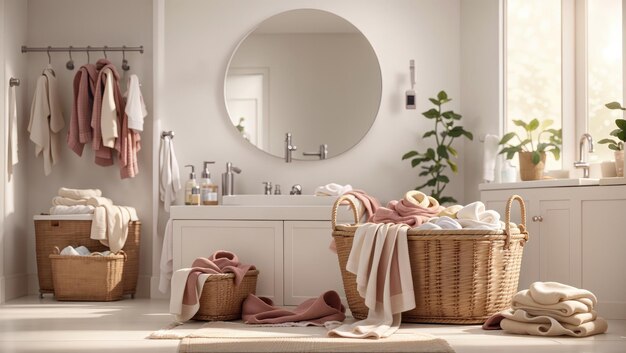A clean and organized living space is not just visually appealing; it can have a profound impact on your mental and emotional well-being. The psychology of cleanliness delves into the intricate relationship between our surroundings and our mental state. In this article, we will explore how a tidy space can significantly improve your overall well-being, from reducing stress to enhancing productivity and fostering a sense of calm.
As you strive to maintain a clean and harmonious environment, consider the assistance of reliable house cleaning services. These professionals can contribute to the upkeep of your living space, ensuring it remains a haven of tranquility and positively influences your mental and emotional health.
By engaging reliable house cleaning services, you can enjoy the benefits of a well-maintained home, promoting a sense of balance and serenity in your daily life.
The Clutter-Stress Connection
The presence of clutter in your living space can trigger stress and anxiety. The clutter-stress connection is rooted in several psychological factors. According to signature cleaning services, maintaining an organized and clutter-free environment not only contributes to a visually pleasing space but also plays a crucial role in promoting mental well-being.
Their professional expertise in cleaning services underscores the importance of a clean and tidy living space in reducing stress and creating a more serene atmosphere. By aligning with insights from Signature Cleaning Services, you can gain valuable perspectives on how decluttering can positively impact your mental state, fostering a sense of calm and promoting overall well-being in your home.
- Visual Overload: Clutter bombards your visual field, overwhelming your brain with stimuli. This constant visual noise can lead to heightened stress levels.
- Decision Fatigue: Clutter often results from delayed decision-making. The mental burden of constantly deciding what to do with items can be exhausting and stressful.
- Physical Discomfort: Clutter can obstruct movement and make your living space feel cramped. This physical discomfort can contribute to stress and unease.
Decluttering for Stress Reduction
By decluttering and organizing your surroundings, you can alleviate stress and create a more tranquil environment. Here’s how decluttering helps:
- Enhanced Focus: A clutter-free space allows your mind to focus better, reducing distractions and stress.
- Simplified Decision-Making: With fewer items to manage, you’ll experience less decision fatigue, leading to reduced stress levels.
- Physical Comfort: An organized space promotes physical comfort and relaxation, diminishing stress-related tension.
Boosting Productivity and Efficiency
A clean and organized space fosters productivity by creating an atmosphere of orderliness and purpose. Here’s how it works:
- Reduced Cognitive Load: When your environment is cluttered, your brain expends energy processing the chaos. An organized space reduces this cognitive load, allowing you to think more clearly and make better decisions.
- Efficient Workflow: An organized workspace, whether at home or the office, streamlines tasks and processes. This efficiency can boost productivity and save valuable time.
- Goal-Oriented Mindset: Tidiness encourages a goal-oriented mindset. You’re more likely to stay focused on your tasks and achieve your objectives in an organized space.
Creating a Productivity-Friendly Environment
To enhance productivity and efficiency, consider these strategies:
- Clear Your Workspace: Keep your work surface clutter-free. Only have items relevant to your current task within arm’s reach.
- Establish Routines: Set daily or weekly cleaning and organizing routines to maintain order and structure.
- Prioritize Tasks: Use to-do lists or task management tools to prioritize your responsibilities, reducing overwhelm.
The Calming Effect of Cleanliness
Emotional Well-Being
A clean and organized space contributes to emotional well-being by fostering a sense of calm and tranquility. Here’s how:
- Reduced Anxiety: Knowing where everything is and having a clutter-free environment reduces anxiety associated with searching for misplaced items.
- Enhanced Relaxation: A clean and tidy space invites relaxation. It’s easier to unwind when your surroundings are soothing.
- Positive Outlook: A clutter-free space can lead to a more positive outlook on life, as you’re less likely to feel overwhelmed by your surroundings.
Mindful Cleaning for Mental Health
Engaging in mindful cleaning practices can further enhance your emotional well-being:
- Focus on the Present: While cleaning, immerse yourself in the task at hand, temporarily freeing your mind from worries about the past or future.
- Practice Gratitude: Take a moment to appreciate the effort you’re investing in creating a clean and inviting space. Gratitude can boost your mood.
- Sensory Experience: Pay attention to the sensory aspects of cleaning, such as the feel of warm water and the scent of cleaning products. These sensory experiences can be calming.
The Social Aspect of Cleanliness
Cleanliness and Relationships
Your living environment can impact your social well-being and relationships in several ways:
- Hospitality: A clean and organized home is more inviting to guests, fostering positive social interactions.
- Stress Reduction: A tidy space reduces stress, making it easier to engage in harmonious relationships with family members and roommates.
- Enhanced Social Confidence: When your living space is clean, you’re more likely to feel confident about inviting friends over and hosting gatherings.
Collaborative Cleaning
In shared living spaces, collaborative cleaning efforts can strengthen relationships and promote a sense of responsibility:
- Communication: Open communication about cleaning expectations and schedules can prevent conflicts and ensure everyone contributes.
- Shared Goals: Collaboratively setting cleaning goals fosters a sense of teamwork and shared responsibility.
Final Thoughts
The psychology of cleanliness highlights the powerful impact of an organized and tidy living space on your mental and emotional well-being. By recognizing the clutter-stress connection, boosting productivity and efficiency, embracing the calming effect of cleanliness, and considering the social aspect of cleanliness, you can harness the benefits of a clean and organized environment.
Ultimately, maintaining a serene living space is not just about aesthetics; it’s a holistic approach to enhancing your overall quality of life and well-being.

